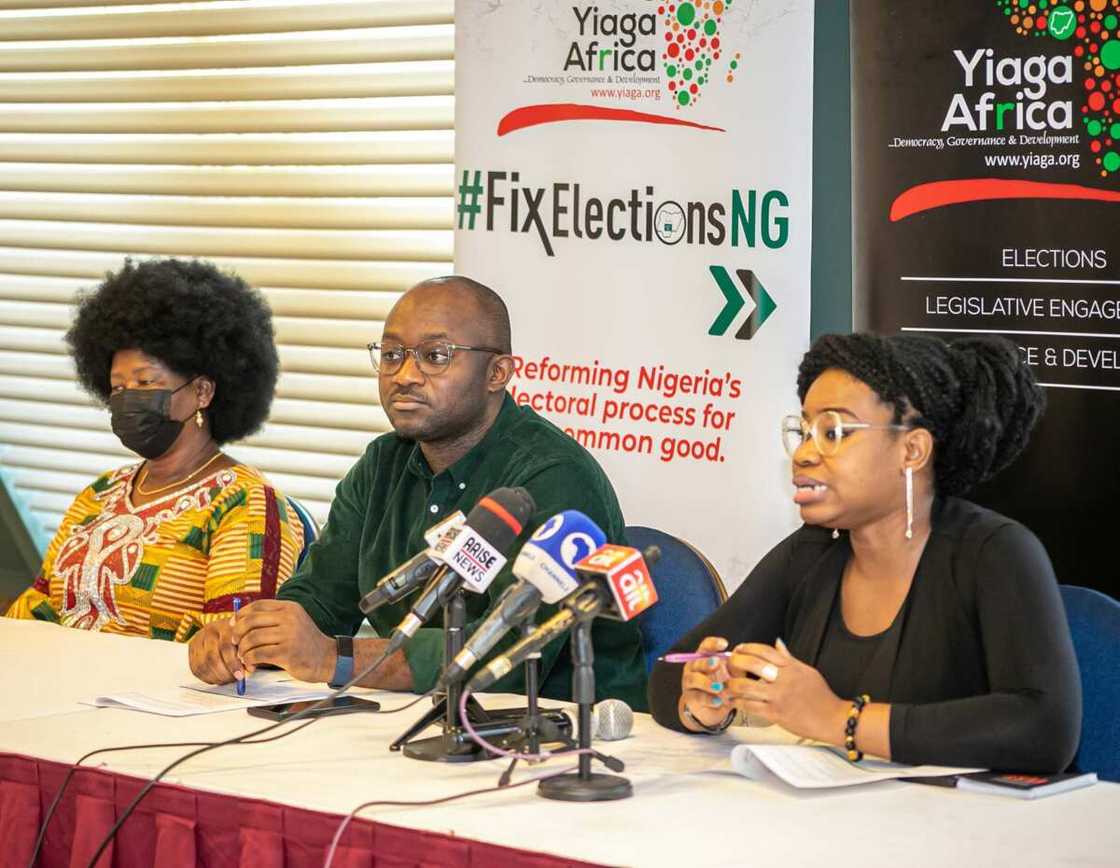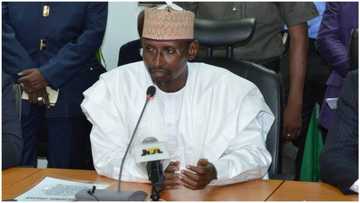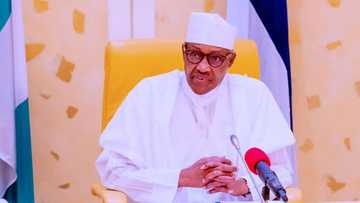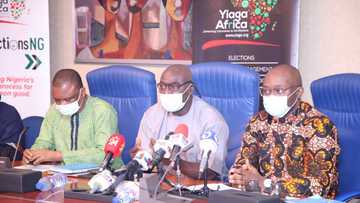CSOs Reveal Electoral Amendment Bill Has Drafting, Cross-Referencing Errors
- Prominent civil society groups are working round the clock to ensure that the Electoral Amendment Bill is signed into law
- The groups say they have discovered cross-referencing errors in five sections and grammatical errors in two sections of the bill
- In August 2018, Buhari premised his decision of declining assent to the 2018 Electoral (Amendment) Bill on certain drafting errors and cross-referencing gaps
PAY ATTENTION: Click “See First” under the “Following” tab to see Legit.ng News on your Facebook News Feed!
FCT, Abuja - A coalition of Civil Society Organisations on Thursday, December 30 revealed that they have discovered cross-referencing errors in five sections and grammatical errors in two sections.
Also discovered by the CSOs were duplicate provisions in three sections and conflicting provisions in one section of the Bill.

Source: Facebook
They made this known at a press briefing attended by a Legit.ng reporter in Abuja.

Read also
New Year: FCT imposes new Covid-19 restrictions on worship places, bans parties, night club
They, therefore, called on the National Assembly to carry out a comprehensive review of the Bill to ensure all that editorial, drafting and cross-referencing gaps were addressed since President, Muhammadu Buhari had declined his assent to it.
PAY ATTENTION: Join Legit.ng Telegram channel! Never miss important updates!
The CSOs comprised Yiaga Africa, Civil Society Legislative Advocacy Centre, Nigerian Network of Non-Governmental Organizations, Premium Times Centre for Investigative Journalism, International Press Centre and Centre for Citizens with Disability.
Others were Nigerian Women Trust Fund, Partners for Electoral Reform, Women Advocates Research and Documentation Centre, The Albino Foundation, CLEEN Foundation and Institute for Media and Society.
Speaking at the briefing on behalf of the CSOs, Executive Director of Yiaga Africa, Samson Itodo said:
“Following the president’s decision to decline assent to the Electoral Bill 2021, civil society groups undertook an in-depth and comprehensive review of the Bill to ensure all editorial, drafting and cross-referencing gaps are addressed.

Read also
Jubilation as FG announces free train rides for Nigerians from December 24 to January 4 ahead of Yuletide
“The review identified drafting errors, repetition and cross-referencing gaps in eleven sections of the Bill.
“Cross-referencing errors were identified in five sections of the Bill, grammatical errors in two sections, duplicate provisions in three sections and conflicting provisions in one section of the Bill.
“Without doubt, these errors will occasion controversies and legal complications in the implementation of the bill when enacted.”
“Therefore, it is imperative for the National Assembly to ensure due diligence before transmitting the Electoral Bill 2021 back to the President for assent to prevent the current bill from suffering the same fate.
“As part of civil society’s contributions to the ongoing reform process, a detailed memorandum was submitted to the leadership of the National Assembly on December 29, 2021.”
“The memorandum highlights the affected sections and specific recommendations for addressing the errors.”
In August 2018, President Buhari premised his decision of declining assent to the 2018 Electoral (Amendment) Bill on certain drafting errors and cross-referencing gaps in the Bill.

Read also
COVID-19: Lagos decries lack of Modena Vaccine as FG destroys 1million doses of AstraZeneca
Asked by Legit.ng if those calling for direct primary are not within their rights, Itodo said:
“The fundamental issue is where are we in this whole trajectory of our electoral reforms. We are in a state of national election emergency.
“If we are not careful, we are going to lose the opportunity to test some of the innovations in the electoral bill.
“Let's not reduce the electoral bill to either electronic transmission of results, or mode of nomination of candidates in primary elections.
“There are other fundamental reforms in the bill. For us as stakehoklders, we are looking at the sum-total of the bill. For us, our current position is that we need this law to facilitate preparations for elections. Further delay, will undermine the elections.”
On her part, Cynthia Mbamalu, Director of Programmes at Yiaga Africa, noted that they have been a lot of interest in the electoral reform process, especially among young people.

Read also
Full text of Buhari’s letter informing National Assembly of his refusal to sign Electoral Act Amendment Bill
She said:
“Young Nigerians are looking up to the National Assembly and the president to restore their hope in our electoral process and a speedy passage of this bill into law will assure young people that truly this government believes in its people and democracy.”
She also called on the National Assembly to resume earlier than planned in 2022 to get a better consensus on the issues raised and transmit the bill back to the president, especially before the off-cycle elections next year.
Electoral Bill: Override or remove contentious clause - CSOs tell National Assembly
The CSOs had earlier expressed their disappointment at the failure of President Buhari to sign the Electoral Amendment Bill 2021.
In a statement sent to Legit.ng on Tuesday, December 21, they lamented that the withholding of assent by the president to a bill undermines public confidence and trust in Nigeria's electoral system.
The groups, however, advised the National Assembly to either override the president to sign the bill or remove the contentious clause and return it back to the president.
How Kwankwaso predicted Buhari won't sign Electoral Amendment bill
Recall that a former Kano state governor, Senator Rabiu Kwankwaso, had predicted that President Buhari won't sign the Electoral Act amendment bill.
Kwankwaso alleged that some state governors pressured the president not to sign the bill because of the provision for direct primary.
He said though the direct primary option is better, governors do not want it because it makes them less powerful in the scheme of things.
Source: Legit.ng



